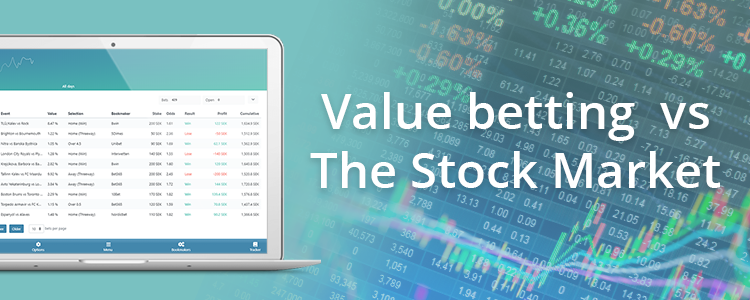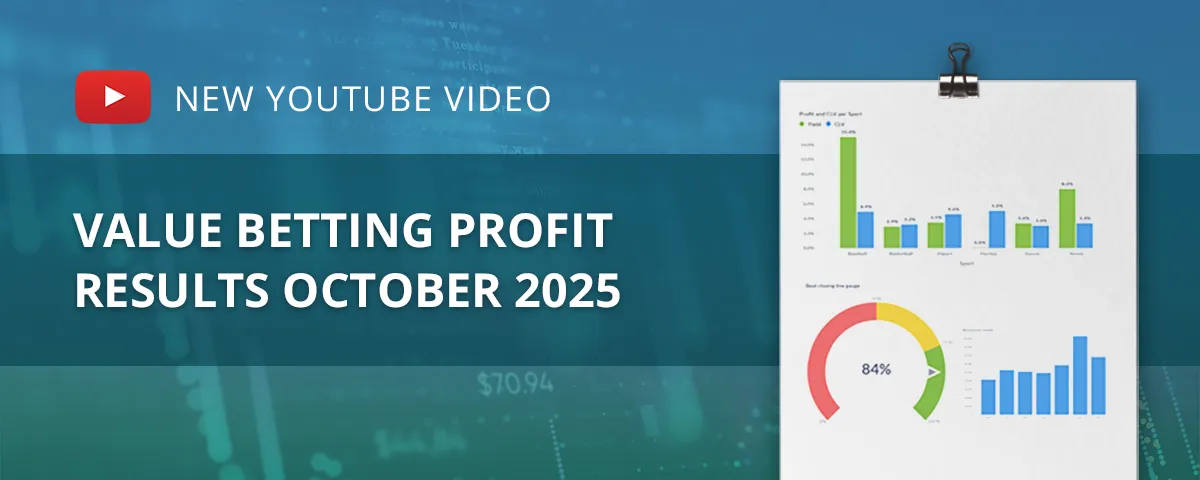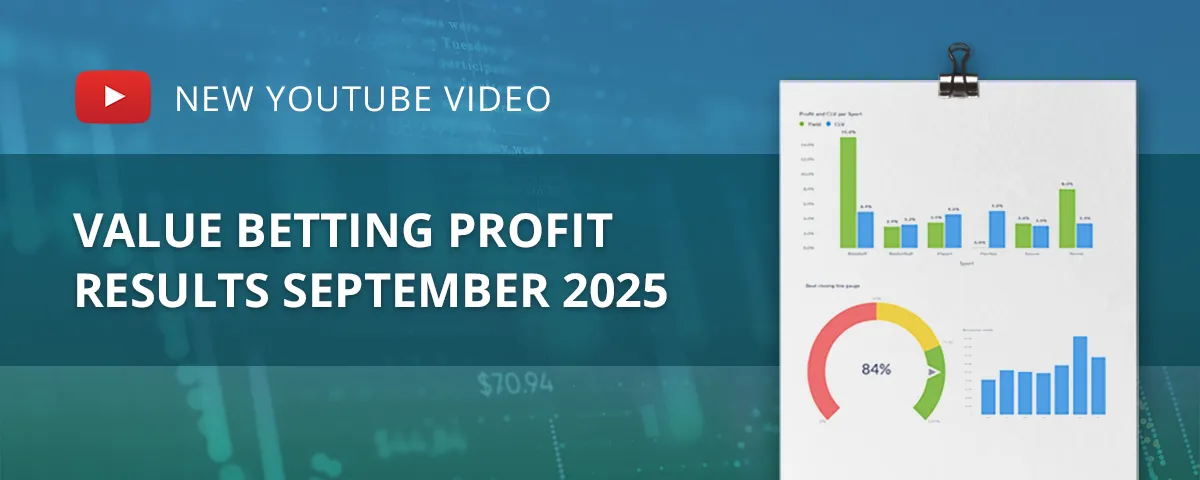Have you ever wondered what is the better way to put your money to work – pursuing a Value Betting strategy or investing in the stock market? I certainly have and there is no easy answer to that question. There are a lot of factors you need to consider, like the capital you have at your disposal, the time you are willing to put in learning and execution, as well as the legal and tax aspect.
Today I will go through all these factors to help you determine whether Value betting is the right investment for you or whether you would be better off just buying in the stock market.
Before I dive in allow me to briefly introduce myself. My name is Nenko and I am the author and editor of the betting blog The Church of Betting. We decided to collaborate with RebelBetting in the form of a series of articles. Let's dive into today's topic: Value Betting vs the Stock Market.

First, before diving deeper into the comparison, let's check out this video below to learn the top arguments why value betting is better than stock market investing.
Does it even make sense?
An important question to address first is – does such comparison even make sense? Investing in the stock market, you buy a share of a company. This company probably employs a lot of people and produces valuable goods and services. It is easy to see how you add value with your investment. Directly or indirectly, you help a company to finance its costs of operation and to continue and expand its activities. In most cases, it is easy to see where the value of your share comes from. Therefore, investing in the stock market is viewed by most as a legitimate and proper way of growing your savings.

Value betting on the other hand is a type of a betting strategy. In betting, you make a guess about the way a game is going to end. You then compare your guess with the bookmaker's. If the two differ and you are confident enough in your prediction, you make a bet. If you are right more often than you are wrong, you can make money. If not, the bookmaker makes money and you lose.
Zero Sum Game?
Financially, it is a zero-sum game, mostly won by the bookmaker. If the latter wouldn't be the case, the bookmaker would quickly be out of business. Therefore, betting is viewed by many as an activity to be avoided. Furthermore, as a type of gambling, betting can tend to be addictive and suck you in, leading you to lose even more money.
So, if you want to invest, you go to the financial markets. If you want to have a little fun, you place a small bet at the bookmaker and watch out not to overdo it. So goes the general wisdom.
And by and large, that is all true. However, as usual, the devil is in the details.
What makes value betting special?
In order to remain profitable, the bookmaker does not need to win every bet. It just needs to win enough of them to make money. Therefore, most bookmakers don't aim at having the most accurate odds possible. Rather, they want to have odds that are just good enough in order to beat most of their clients. Having perfect odds is expensive and not necessary.
This is the Achilles' heel of the bookie. It is also an entry point for a punter willing to make money. The bookie must price thousands of events at any given time. A punter can bet only a few of those. Perhaps 99% of those events are priced by the bookmaker very well. The 1% that are not though still give the opportunity for plenty of profitable action for the punter.
Be the top 1%
While the rest of the punters play the 99%, you can choose to be selective and play the 1% of profitable bets. You can easily identify those using the value betting service of RebelBetting. In this way you will always have a positive expected value and your bank will grow with time. While betting is a losing activity for most, value betting is profitable.
Key benefits of value betting:
How profitable exactly?
Your edge from a value bet can range from 0% to double-digit percentage points. It is fair to say that a ROI (return on investment) of 5% is attainable for most, if you avoid the lower-edge value bets. In other words, for every unit turned over, you could expect to get back 1.05 units on average. How about stocks?
In the last 100 years, the engine of capitalism has ensured that the economy was on an upward trend. The average historical annual return of the S&P 500 index for the last century was around 8%. There is no guarantee that those returns will remain the same in the future, but it is an estimate to work with.
Over a timespan of many years such return can increase your investment nicely via the wonder of compounded interest. If you had invested a dollar in the S&P 500 index at this time of the year in 1980 you would have had 30 dollars today. And while the S&P 500 is a broad index, with stocks you can be just as selective as with your bets, so if you manage to do a bit better than the average investor (warning: you probably won't) you can get even more than that.
So the stock market is more profitable?
Not really. Again, some attention to detail is warranted. In the case of the S&P we are talking about 8% annual return. In comparison, value betting gives you around 5% return on turnover. You certainly don't need a full year to roll over a small to mid-sized betting bank of several thousand $/£/€. In fact, using a tool like RebelBetting in most cases you can do that within a week, or perhaps even a few days.
If we assume a 5% ROI for a week and 52 weeks in a year, that equates to an annual return of 1,05^52 – 1 = 1164,28%. As you see, slightly better than 8% a year.
Now, 1164,28% per year sounds a bit too good to be true.
Subscribe today
Start using the fastest, most user-friendly, value betting and sure betting service on the market. At any given time, RebelBetting finds thousands of profitable bets for you to bet on.
P.S. To get the best possible offer make sure you join for a longer period of time – up to 30% off.
RebelBetting Pro
- Value bets & sure bets
- Maximize your profit
- The most profitable bets
- Access non-limiting bookies
RebelBetting Starter
- Value bets & sure bets
- Great when starting out
- ROI over 30% / month
RebelBetting Pro
- Value bets & sure bets
- Maximize your profit
- The most profitable bets
- Access non-limiting bookies
RebelBetting Starter
- Value bets & sure bets
- Great when starting out
- ROI over 30% / month
Profit Guarantee
We know our products work.
In fact, we are so confident about it that we offer a Profit Guarantee.
If you don't make a betting profit in the first month you get another month for free.
Again and again until you profit. We take all the risk.
What's the catch?
It really is and the truth is, we are comparing apples with oranges here. There are some caveats to that number and I will go through the list below.
1. Not a passive income
Buying stock is a set-and-forget type of investment. You can put some money in today, come back in 30 years and collect your profits. Not the case with value betting. You must actively place your bets, as well as take care of money management (deposits and withdrawals), account verification, risk management, research of reliable bookmakers, recording your bets and so on.
Granted, you can do value betting in parallel to your full-time job. In my experience, you can fit it within an hour a day and most games are taking place on the weekend anyway. Still, value betting is far from a passive investment in the true sense of the word. In addition to investing some money to fund your starting bank, you will also have to do quite a bit of work for those winnings.
2. Limited upside
The stock market is huge. There is not a single individual or entity in the world that couldn't accommodate its capital in securities of some kind. The Government Pension Fund of Norway is worth north of US$1 trillion and is fully invested in the financial markets.
In value betting on the other hand you are placing bets. The size of those bets is limited by the bookmaker. The limits depend on the event and the market. In a recreational bookmaker (the kind where you would do technical value betting), even in the most liquid markets (say, 1X2 in the Premier League), you wouldn't be able to bet more than 4 figures. On most markets you can hardly even bet 3 figures.
Provided that you place 40-50 bets with an average size of a hundred bucks (realistic on an average sports weekend), that is still a decent amount of money for most people. However, here comes the bummer:
Recreational bookmakers will ban you
If you do value betting, you will win money. This automatically means that the bookmaker will lose this money. Bookmakers don't like that. Financing your value betting hobby is certainly not their business. Once they find out you are doing it, you are out. In most bookmakers that translates to limiting your bets to some laughable amount of, say, 1 $/£/€ per game. At this point there is nothing left for you than to withdraw your whole balance and look for another bookmaker to bet in.
At some point all your options will be depleted. Depending on the bookmakers you have at your disposal, this might take quite some time or not so much. In most cases, before you get there you can make a pretty decent profit to show for it.
3. The volatility of returns is huge
The stock market is not just about expected returns, but more about the risk/return ratio you get as an investor. A famous indicator called the Sharpe ratio measures the relation between your risk-adjusted expected return and the standard deviation of that return. Different investors would invest in differently risky asset classes, depending on their risk profile. Taking on more risk is usually rewarded with higher returns.
In the financial asset universe, stocks pass as one of the more risky asset classes. Therefore they are normally mixed in a portfolio with other asset types such as bonds and cash, in order to reduce the volatility of the portfolio by means of the lower risk of those other asset types, as well as risk diversification.
You can easily see why – during the currently raging COVID19 crisis, the S&P 500 managed to lose a third of its value in a bit less than a month:

It also rebounded quite a bit since then. Still, it is far from its previous heights and continuously makes for a lot of stress for those who are heavily invested.
Well, value betting is worse than that.
The volatility in a value betting strategy can be massive. In a stock market crash you could lose a third of your savings within a few months. Such a crash occurs two or three times in a generation. The thought of losing a third of your savings sends shivers down the spine of the average worker, used to the stable income granted by his paycheck.
In value betting, you can lose a third of your bank in a day. This has happened to me a few times. On each of those occasions I got that money back and more. Still, going through such days takes a toll on you. Of course, your starting bank is way smaller than your lifetime's savings, since there is only so much money you can put to use in a recreational bookmaker. Therefore, the comparison to the stock market volatility is a bit unfair. But on relative terms, it can hurt quite a bit. Therefore, never bet more than you can afford to lose.
To get a clearer picture, here is an example of a recent drawdown I witnessed:
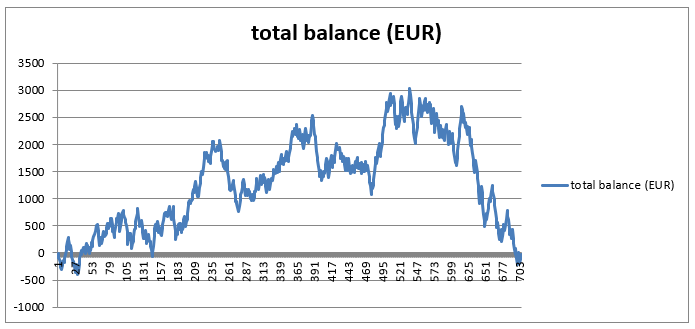
After 700 bets it was all back where it started. That might be a month's worth of work or more. The large drawdown of more than €3000 occurred in less than a week. For most people (me including) this is hard to stomach.
This is how the graph looked like at the end:
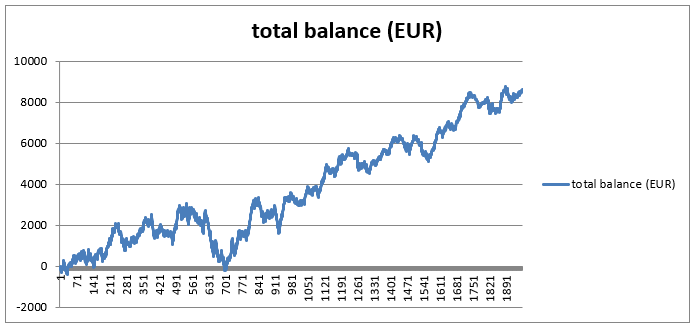
As you see the story has a happy ending. And yet, you have to get through the first stage in order to reach the second one. This works only if you have enough capital to survive the drawdown. So, if you value bet, do expect the downward volatility and be prepared for it.
4. Tax and legal aspects
In many countries sports betting is restricted in some way or another, while investing in the financial markets is allowed or maybe even encouraged. I have outlined the reasons for this above. In other words, before you subscribe to a value betting service you have to ensure that the legal environment in your country allows you to make the most of it.
Mostly tax free winnings
However, a sweet benefit of value betting in most countries is that the winnings are tax-free. The reason for this is that if you are being charged tax on betting profits, you would also have to be allowed to deduct betting losses from your taxable income. Since the large majority of punters are losing, such tax arrangement would be a losing proposition for the state.
Of course, that is great news for the value bettor. In most of the developed world your profits from the financial markets could be taxed with anything from 10-15% to up to 35%. This is certainly an important factor to consider and one that usually favors value betting.
The Verdict
To summarize, value betting is way more profitable than the stock market per dollar invested. However, its returns are also much more volatile, it offers only a limited upside and is not a passive income in the true sense of the word. You have to invest some time and effort to make it work.
This is not an either-or question. The stock market is an essential tool for building wealth and saving for retirement and value betting can't replace it in that sense. Nor does it have to. The stock market remains one of the very few places where you can make a set-and-forget investment, with significant capital and for a reasonable return. If, on the other hand, you are just starting to set some savings aside and have a bit of extra time, you can kick-start that process with the help of value betting.
Conclusion
Getting started with value betting would certainly require some effort on your side, but remains one of the few proven ways to profit from sports betting. Value Betting by RebelBetting is the perfect tool to help you in that process. With the profit guarantee and the option to unsubscribe any time, there is not much to lose. Plus, with ESports recently being added to the portfolio and some big football leagues already having restarted, the volume of value bets will soon come a lot closer to usual.
That was it for now, I hope you enjoyed the article and am very much looking forward to my next contributions to the Rebelbetting blog. Stay safe out there and good luck!
Did you find this article interesting? Check out more articles about value betting and more articles about sure betting on our help section pages.
Subscribe today
Start using the fastest, most user-friendly, value betting and sure betting service on the market. At any given time, RebelBetting finds thousands of profitable bets for you to bet on.
P.S. To get the best possible offer make sure you join for a longer period of time – up to 30% off.
RebelBetting Pro
- Value bets & sure bets
- Maximize your profit
- The most profitable bets
- Access non-limiting bookies
RebelBetting Starter
- Value bets & sure bets
- Great when starting out
- ROI over 30% / month
RebelBetting Pro
- Value bets & sure bets
- Maximize your profit
- The most profitable bets
- Access non-limiting bookies
RebelBetting Starter
- Value bets & sure bets
- Great when starting out
- ROI over 30% / month
"A game changer"
Value betting and Sure betting are two really interesting products from RebelBetting that are tailored for you who wants to take betting to the next level. You'll be sent loads of profitable bets your way and will learn a completely new approach to betting – a game changer! Read the Swedish RebelBetting article.
"Outstanding"Not only can you not lose with RebelBetting's first month Profit Guarantee, you won't lose with their outstanding and consistent strike rates! Simply follow their value betting, track the live scores as you play, and you'll be well on your way to becoming a profitable bettor.
"Trust the system – you will make money in the long run"So far, I have earned about 52,000 SEK (around 5,096 EUR) with the help of this service alone! This is a really good service and it is well worth the monthly cost. I discovered how easy it can be to make money betting without any real knowledge or interest. Trust the system and if you follow it, you will make money in the long run.
"It's taken me less than two months of value betting to make as much as I made from matched betting in a year"
Read the full interview here.
"Love the possibility of making risk-controlled investments"I love this type of platform where there is the possibility of making risk-controlled investments that give long-term returns. Also, it is very rare, in any sector, to find such careful and punctual customer care.
"In under six months I've made a profit over 5000 EUR"I think ValueBetting is awesome and I have made very good money with it.
"€1000 profit after one month"The program works and is easy to use. I started with around €1600 and have a €1000 profit now after one month.
"I have almost quadrupled my initial deposit"I have placed about 4500 value bets, while I have almost quadrupled my initial deposit by now, in less than 2 months.
"I'm finally profiting."Thanks to you guys I'm finally profiting from betting.
"I have made £4,515 profit with an 8.47% ROI"Good news! I have made £4,515 profit. Using ValueBetting no more than 20 minutes each day, mostly just using my phone, I've almost doubled my bank in two and a half months.

